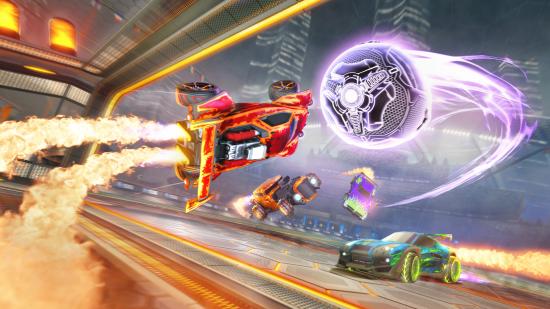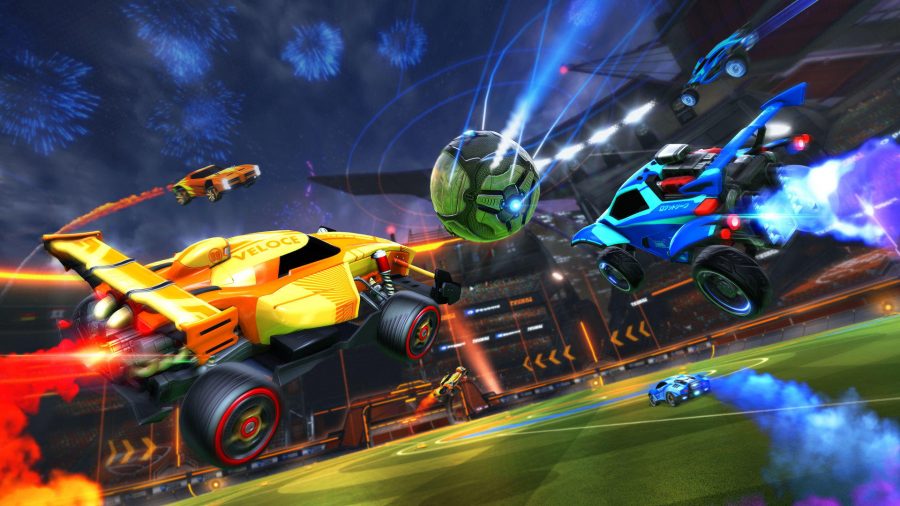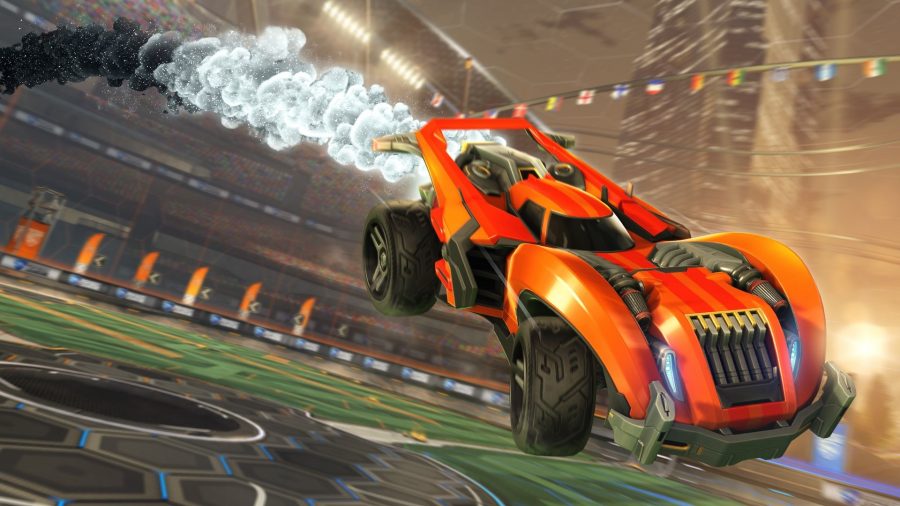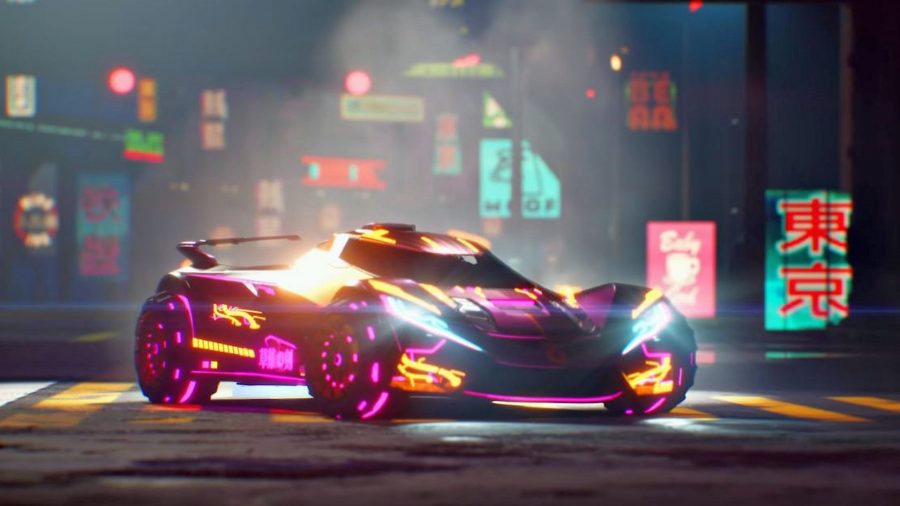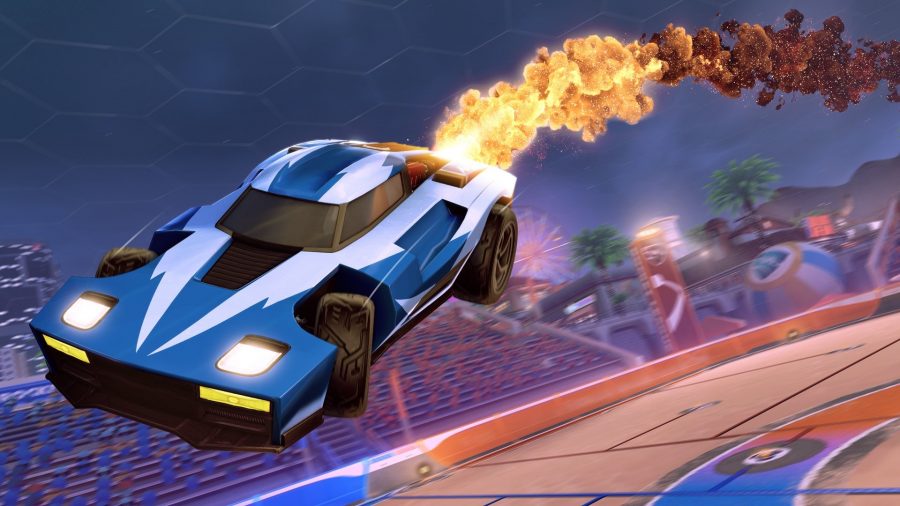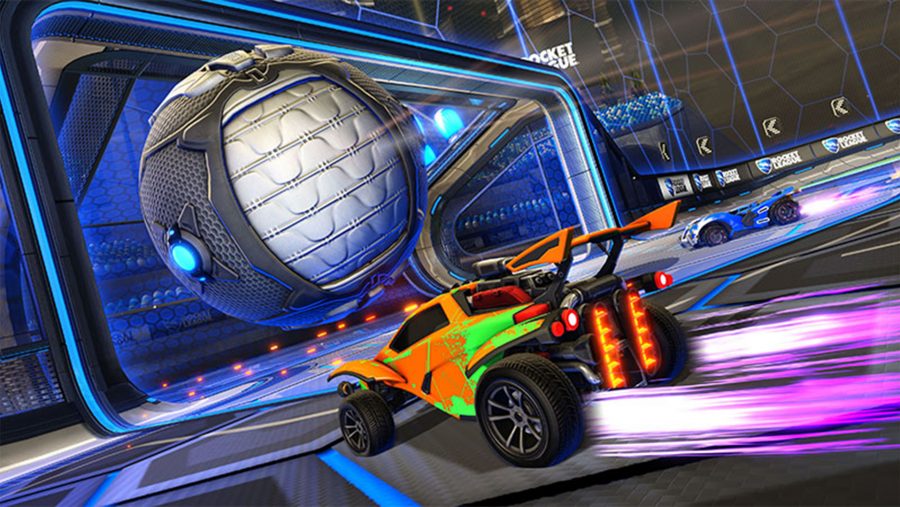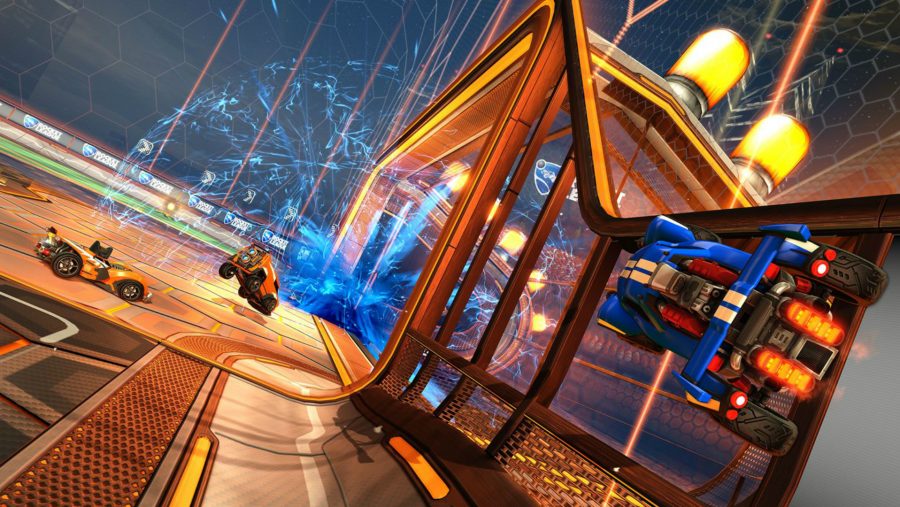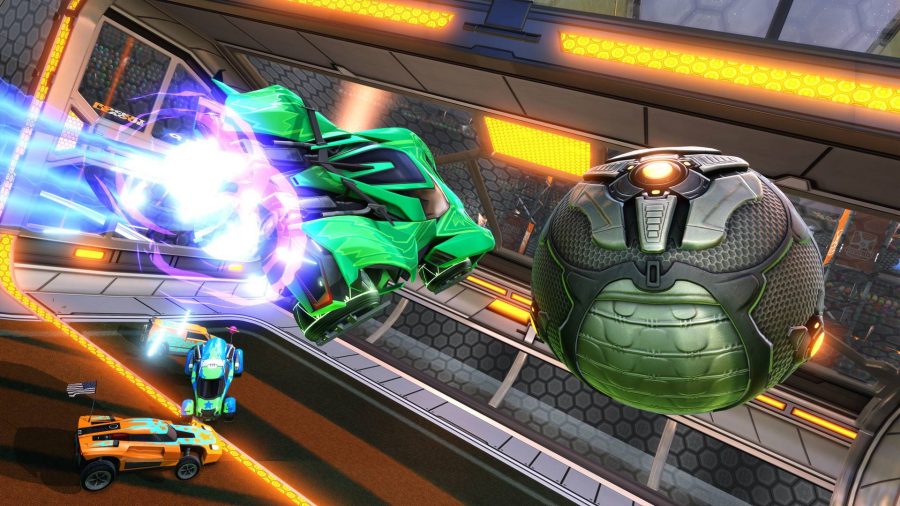October 7, 2020 From the vaults: this feature was originally published on February 16, 2016.
Did you know Rocket League is a sequel? If you’ve heard of 2008’s Supersonic Acrobatic Rocket-Powered Battle-Cars, then the answer is probably yes. If not, you might be surprised to know that over two million people downloaded the now eight years old PS3-exclusive and forerunner to last year’s cars-in-a-cage slant on football that launched developer Psyonix into stardom.
Let me be frank with you: I was aware that Battle-Cars existed before, but had no idea until well after Rocket League’s release last July that the two were related. And yet they’re almost the same game.
“This time I think we were just able to do everything right across the board, whereas before we had a much smaller team,” Psyonix’s director of development Thomas Silloway suggests. “This time, we made a really good game, we had a really good marketing plan for getting the word out there, and then it kind of went viral as we were getting close to release. A bunch of people picked it up on Twitch from our betas and it just started getting a lot of hype.”
Compared to its lesser known predecessor, Rocket League is a far more refined experience. Gone are the perfunctory façades and at times complicated guidelines of old, and in their place are simple rules, a simple premise, and a simple goal. Mastering the art of the double-jump or nailing a mid-air volley can demand hours of practice, yet what makes Rocket League so special is its accessibility: it welcomes first-timers with the same enthusiasm as returning veterans.
Interestingly, Battle-Cars started out on a completely different path. Had it not changed course, Rocket League as we know it today might never have existed.
“One day we threw a ball into the map with us,” Silloway says, recalling time spent playtesting Rocket League’s older sibling the best part of a decade ago. “We were playing a game of hitting it around and we ended up deciding that was way more fun than the other game we were playing. We just kept playing that game over and over in our playtests and it was actually taking away from the work we were doing on the vehicular combat game.
“At some point, we were like: either we have to stop playing this game, or we have to make this our new game because we’re not getting any work done on the other one.”
Had the decision to pursue the original, destruction derby-esque idea been followed through, Rocket League “absolutely wouldn’t be what it is today,” Silloway reckons. “We knew the other game we were making was pretty fun, but it turned out that when we threw the ball in there it became ten times better. If we hadn’t done that, I think we would’ve ended up releasing the other version of the game. It was a really interesting fork in the road where we ended up having to choose what to do.”
Founded by Dave Hagewood at the turn of the millennium, Psyonix spread itself between work on the ill-fated Vampire Hunter: The Dark Prophecy and Unreal Tournament 4. In the latter, Hagewood designed and prototyped vehicle physics in the game’s Onslaught Mode – a vehicle-oriented setting where you’d work to destroy the opposition’s power core to secure victory.
With a deep understanding of the Unreal Engine, then, Hagewood’s ability to make cars tumble around enclosed arenas with a degree of believability, and with an appreciation of how to make this overall experience fun, the foundations were laid for what would eventually become Battle-Cars.
Silloway entered the Psyonix fray a couple of years later – nine and half years ago now, he says – by virtue of a competitive programming internship when the team comprised just Hagewood, Jerad Heck, Ben Beckwith, and a few others. Although now over 40 members strong, only a select few made it through the internship process back then to form the team that shipped Battle-Cars.
More cars, less football? Check out the best racing games on PC
“When we came on board we already had some version of wacky car games going on,” he says, before they realised lobbing a ball into the fold would make for a far better game.
While a community formed around Battle-Cars post release, undistinguished sales and reviews dealt Psyonix their biggest blow. They’d poured a lot of effort into crafting a game they felt deserved more love and attention. However, Silloway notes that naive decisions made on marketing and promotional matters were likely what hampered the success of their first self-published release.
“I think we always thought we had maybe made a couple of mistakes back then when Battle-Cars came out, especially with our decisions around marketing,” he says. “We felt we weren’t really able to get the word out to enough people. Then again, the people that we did reach were really addicted to the game, and then they saw the merits that we saw: a game that was super fun and super addictive.
“We always knew that if we could reach a bigger audience, polish up a couple of things, make it a little more accessible so that it’s not quite as difficult to get into, that we’d be able to do it better the next time. I think all of those things really paid off.”
Given the less than stellar reception Battle-Cars endured, remaking what was essentially a very similar game – self-publishing for a second time, starting over, pouring yet more blood, sweat, and tears into something that might not succeed – was a gamble, to the point where Silloway recalls being unsure of how it’d go right up until release. Alpha testing on Steam seemed to have gone well, however the decision was made to close it down in order to refine certain issues players had flagged.
A similar pattern occurred in beta testing. There were signs of burgeoning interest, yet, again, gauging just how much interest with any level of reliability was impossible – after all, many of the alpha and beta testers were members of the existing Battle-Cars community. Thus, Psyonix was apprehensive. It’d been here before, and understood the precarious balance between optimism and overconfidence.
“We were trying to strike a good balance between the spirit and the feel of the original game while also making it a lot more accessible,” Silloway says. “Over the course of our development we were constantly going back and forth between the two extremes. Feedback from [experienced players] really helped us refine some of the controls and see what their reaction would be to it. Throughout, we were constantly evaluating how good our decisions were, and what impact they’d have on the game when it came out.”
Competitive type? See The Loadout’s guide to Rocket League ranks
A process for separating the wheat from the chaff in feedback became essential to Rocket League’s development, as Silloway and the rest of the team constantly iterated, streamlined, and refocused what they’d made before. There was much scope to create a bigger and broader game, but in the end, paring it down became the real challenge.
When Rocket League did eventually launch, it took off. When its forerunner had launched in 2008, YouTube was in its dawning years, social media had a far shorter reach than it does today, and streaming outlets such as Twitch didn’t exist whatsoever. Seven years later, Rocket League’s fanbase has exploded. By the end of 2015, Psyonix’s breakout had been downloaded over eight million times, and accrued over $50 million of sales across all platforms.
On YouTube, a whole subculture of players have come together to perform, record, and upload tricks and skills, acrobatics and great goals, and it seems this dedicated facet of the game’s fanbase are as committed to showing off their talents as they are playing the game itself.
“This is really amazing,” says Silloway. “They’re taking our idea and really taking it to the limit of where it can be. I actually don’t think we’ve seen all that you can do in the game, which is really neat. The emergent gameplay, it allows you to continue to keep coming up with stylistic shots or saves. It’s just a really good feeling to know that you’ve affected people in this way.”
Another phenomenon which has flourished since Battle-Cars’ release is esports. Silloway admits the team hoped Rocket League would find its place within the competitive community, but that this prospect would be hinged upon interest – both in playing and spectating.
“We didn’t want to force it,” Silloway says. “But the stuff that’s come out of esports so far has been spectacular and those players that are at the top tier do amazing things with the ball – stuff that I’d have no hope of possibly doing! It’s really cool to see all the esports expanding, and we have some really big plans this year. We’re gonna make esports awesome for Rocket League. We like that the game has become so popular so we’re chasing ideas that will help keep it in people’s minds, keep people talking about it, keep people playing.
“We’re actively looking to enhance the game and bring new features and bring new content that will help that. Again, we have a lot of big plans coming up to really help push esports to the next level. I would hope that some of those plans will come to fruition in the next couple of years.”
At its core, Rocket League is football (soccer) with cars. Many of the Psyonix team are sports fans, Silloway tells me, and many of them play in amatuer adult leagues around San Diego. Yet, even if you’ve no interest in football or sports in general, even if you hate sport altogether and have never watched a match in your life, there’s fun to be had in the cage.
The incremental process of learning how to judge the physics of the oversized ball, of successfully shooting for goal for the first time, or of perfectly judging a high cross, is an immensely rewarding process. Turning the game into a sport, as it were, allowed Psyonix to create structure: you have a team, you keep a score, there’s a time limit, there’s winners and losers – all of these factors add to the fun of it all, even in the event of defeat.
Related: Check out the best multiplayer games on PC in 2020
“You can hit the ball, you can score a goal in your first game playing against other people, and that’s really an amazing feeling,” Silloway says. “Especially when you start feeling out the controls and you realise, hey, there’s way more to the controls of this game than you’d originally thought.
“You can powerslide, you can jump, you can dodge, you can fly through the air and score amazing aerial goals. There’s learning how to be really good at something and mastering a skill, I think really appeals to people. The other aspect is that it can be really competitive with your friends as well.”
With online games, an extensive single player mode, battling friends, seasons, dressing up your car in the literally hundreds of customisation options at hand – that range from the sublime to the ridiculous – esports, and mastering the art of airborne goals to be shown off on YouTube, Rocket League has plenty to offer. Why it’s found success this time round – or even why Battle-Cars failed to do so before – is largely down to timing, I venture. Silloway agrees, but remains convinced that the devs have simply managed to show the world what they knew to be true all along.
“I think the biggest reason it’s been successful is just because it’s a great game,” he says. “We put all of our efforts into this game over the last three years, fully focused on it with our small team. Even before that, we’ve been thinking about the game since the prequel.
“We had all this time from when the original game came out until Rocket League came out to focus on a bunch of community-requested features and things that we personally wanted to do with the game as well. We were just able to spend the time to figure out the best possible way to this and we really spent a lot of time trying to make it just right.”
Although failure did cross Silloway’s mind at times, the self-evident effort he and the rest of the team put into finding success was always going to make the journey worth it. Luckily for Psyonix, Rocket League was a success. And luckily for us, the team will continue supporting it as long as there interest remains.
